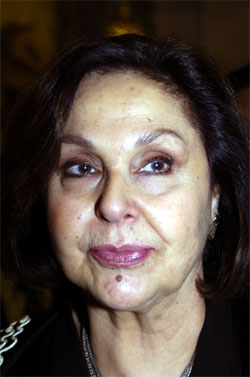Apr 14, 2025
Apr 14, 2025
by Mehru Jaffer
 Lebanese theatre actor and Founder Director of Beirut's Al-Madina Theatre complex, Nidal Al-Ashqar was performing in Paris, France, when Israel launched an attack on Beirut in July last year. With the airport closed, she found herself marooned abroad.
Lebanese theatre actor and Founder Director of Beirut's Al-Madina Theatre complex, Nidal Al-Ashqar was performing in Paris, France, when Israel launched an attack on Beirut in July last year. With the airport closed, she found herself marooned abroad.
But when Nidal was informed over the telephone that refugees fleeing from the war in southern Lebanon were homeless, she immediately opened the doors of Al-Madina to them. In that instance, Nidal wondered about the role that theatre plays in a society and came to the conclusion that it cannot be only to distract and entertain. "Theatre has a role to play in society according to the need of the hour, whether in times of war or during peace," she says.
According to Nidal, though the media is able to capture the physical destruction caused by war it cannot reflect the torment such an act causes to the soul. On her mind played images of thousands of children displaced, once again, by a war initiated by adults. "It is difficult enough for adults to dream under fire, but the impact of war on children is unimaginable," she says. So, even whilst sitting in France, all Nidal could think of were ways to use theatre, the only tool at her command, to help children preserve a bit of their already shattered innocence.
She conveyed her concerns to Muhammad Farhat, the chief technician at Al-Madina, who immediately organised a series of workshops for displaced children in a bid to train their energies into a creative process. In the weeks that preceded the ceasefire, the premises of Al-Madina Theatre became home to 209 children. Under the programme, Dreams under Fire, the children were encouraged to paint, perform theatre, make puppets, tell stories and participate in making films. Inspired by the idea, volunteers from different walks of life poured in, bringing with them care, clothing, crayon and comfort.
But this is just one of the many instances where Nidal has been a harbinger of change. Considered the leading light of cultural resistance within Lebanon as well as the Arab world, Nidal founded Al-Madina Theatre mainly to provide a space for free expression - she looks upon theatre as a platform of free speech - in an environment where censorship penetrates every aspect of civil life.
"Censorship exists around the world but it is nothing like the way it is practised in the Arab world. Civil society is constantly engaged in a dialogue with the authorities. We lie, we cheat and we use charm in an effort to not upset the sheikhs and the priests," she admits. According to her, the Arab world desperately needs to build a society that is able to contain religion to being personal relationship between an individual and his God.
A graduate of London's Royal Academy of Dramatic Arts (RADA), Nidal (often referred to as the first lady of the theatre movement in Lebanon) returned to the country in 1966 to set up The Beirut Theatre Workshop. The years that followed have been termed as the golden period of the theatre movement in the country, till the civil war of the mid-1970s destroyed it.
Nidal, whose name in Arabic means struggle, is a Maronite Christian by birth, but an Arab by choice. In Lebanon, while the Bible is holy for some, for others the Koran is sacred. But Nidal feels this is no excuse for the Lebanese to fight amongst themselves and wishes that people realise that they are all Arabs and that Lebanon is their only home. And she believes that theatre is the only medium through which she can reconstruct, repeat and reflect this reality.
Her greatest contribution has been to rid theatre in Lebanon of its elitist nature and bring it to level of the common man. In the process, she has been able to revive Arabic poetry as well.
In a way, it is only natural for Nidal to be so much in love with theatre. After all, she grew up amidst a lot of drama unfolding daily at her ancestral home in the northern province of Mount Lebanon during the days of colonialism. Her mother always welcomed politicians and freedom fighters in their home and Nidal grew up accepting all those "uncles" and "aunts".
She was happiest when they prepared to stage a festival or a ceremony at home. "Those were the occasions when communities came together. And I loved the crowds," Nidal recalls. And that's what theatre is all about - dressing up, being hospitable and being able to dialogue with groups of people about issues that matter to everyone. Now, Nidal's mission is in life is to help guide young people towards becoming active citizens so that they can build a society that can value democracy and the freedom of expression.
19-Aug-2007
More by : Mehru Jaffer